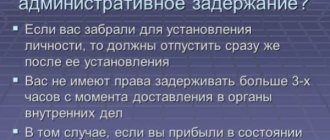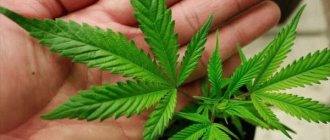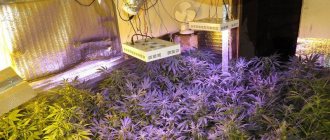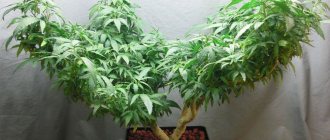Responsibility for growing hemp in 2020
The Criminal Code of the Russian Federation has a separate article numbered 231, which clearly states the punishment for the illegal cultivation of drug-containing plants.
Thus, for breeding and growing cannabis on a large scale, the perpetrator or perpetrators may face the following punishment:
- monetary penalty of up to 300 thousand rubles;
- performance of free work by a convicted person in his free time from his main place of work for a period of up to 480 hours;
- restriction of freedom of a convicted person for up to 2 years;
- imprisonment for up to 2 years.
The punishment for growing cannabis will be harsher if:
- A group of people were engaged in illegal activities.
- The attacker was engaged in the cultivation of prohibited grass on an especially large scale.
In these cases, the perpetrators will face the following punishment:
- imprisonment for a term of up to 8 years with restriction of freedom (up to 2 years) or without such restriction.
What is meant by the term “large” and “extra large” size in hemp cultivation cases?
In the Decree of the Government of Russia No. 1002 of October 1, 2012, as amended on June 22, 2018, “On approval of significant, large and especially large amounts of narcotic substances,” in the paragraph where cannabis, also known as marijuana, is listed, the following meanings are established:
- significant size - over 6 grams;
- large size - over 100 grams;
- especially large size – over 100 kg.
Can they be planted for buying or selling hemp seeds?
Since hemp seeds also contain a narcotic substance, albeit in small quantities, there is also liability for trading in them.
Government Decree No. 460 of 2007 approved a list of permitted hemp varieties that contain a minimum cannabinol content. Such varieties can be sold, but only for industrial purposes, and if there are documents confirming that the seeds belong to this particular variety.
The following gradation has been established for the THC (tetrahydrocannabinol) content in hemp seeds:
- Significant size - more than 0.05 grams.
- Large size - more than 0.25 grams.
- Particularly large - more than 50 grams.
According to the size, the punishment for selling seeds differs.
What is hemp cultivation?
Cultivation of hemp refers to the creation of conditions under which the “grass” will not only grow well, but will also be resistant to adverse weather conditions.
Cultivation also refers to actions aimed at improving cultivation technology, developing new varieties, increasing the yield of hemp, etc.
According to Art. 18 of Federal Law No. 3-FZ of 01/08/1998 “On Narcotic Drugs” it is prohibited to cultivate hemp on the territory of Russia.
The only exception is the cultivation of this “weed” for its further use for educational, scientific purposes, as well as in industry (if it is not used for the manufacture of drugs).
Cultivation of hemp for further legal use for educational and scientific purposes can only be carried out by state enterprises that have the appropriate license.
Cultivation of hemp for industrial purposes can only be carried out by legal entities or individual entrepreneurs.
Legal status of hemp in Russia
Marijuana in Russia is a prohibited substance. It is included in the so-called “first list” of drugs. Since 2010, smoking a joint as such is not punishable by law, with the exception of consumption in public places. But the cultivation of hemp, its cultivation, improvement, transportation, storage and sale are prohibited.
The softening of the legislation in 2010 was that now, with minimal quantities that fit within the logic that a person took cannabis exclusively for personal high, instead of criminal punishment, he faces only a fairly lenient administrative one. Only particularly large cultivation plots and batches of storage, transportation, distribution, etc. now fall under the Criminal Code. (more about their sizes below). But at the same time, hemp is still grown in Russia for use as an industrial raw material, the manufacture of medicines and other “non-narcotic” purposes.
According to the law, only businesses with a special license can legally plant, process and use hemp. If we are talking about medicinal raw materials (cannabinoids are part of many pharmaceuticals) or scientific research, then only state enterprises (federal state unitary enterprises) are engaged in agricultural cultivation and processing of cannabis under the strict control of internal affairs bodies. In 2021, the expansion of these areas was considered at the legislative level due to the fact that sanctions against the Russian Federation on the world stage have reduced the supply of foreign medicines, and they have to be imported.
If we are talking about raw materials for textiles, ropes, food products, insulation in construction, etc., then according to the law, enterprises must grow hemp only of special varieties with a minimized content of cannabinoids, and sell it in a processed form, excluding use “for a high.” " There are such factories in Mordovia, Nizhny Novgorod region and other regions of Russia. Yes, there are seeds among their products, but they have already been processed so that they will not sprout. They are used for feed, for the production of oil, products, or as dietary supplements for raw foodists and vegans.
To avoid confusion, the concepts in the English language were even separated - the narcotic plant began to be called only cannabis, and industrial crops were still called hemp.
However, it will not work to deceive an ordinary citizen by saying that the “personal plot” is intended for ropes and a shirt, because:
- there is no special permitting license;
- will “give out” a high content of cannabinoids during analysis, which is excluded in industrial crops.
Cannabis cultivation: when is there criminal and when is administrative liability?
For growing hemp (cannabis), from which marijuana is made, law-abiding citizens may be subject to administrative or criminal liability. It all depends on the amount of cultivated “grass”.
So, if a person grew hemp on a small scale, then he faces administrative liability in accordance with Art. 10.5.1. Code of Administrative Offenses of the Russian Federation: a fine of 1.5-4 thousand rubles or restriction of freedom for a period of 15 days.
If before May 19, 2010, a person faced criminal liability for cultivating hemp even in small quantities, then since 2010 administrative liability has been provided (in accordance with amendments to Federal Law No. 87-FZ).
By small size we mean growing cannabis of no more than 20 bushes. If there are more than 20 bushes, then this is already criminal liability.
Arbitrage practice
Situation 1. In Astrakhan, a 45-year-old man was convicted of growing hemp, which he cultivated in one of the farms. Hemp plantations were hidden behind strawberry and raspberry bushes. The attacker watered the “grass” using drip irrigation, so the grown hemp reached a size of 2 meters. In total, investigators counted about 700 bushes of illegal weed growing on an area of about 250 square meters. m. During the proceedings, it was established that the suspect had previously been prosecuted for the illegal acquisition and storage of illegal substances. The judge sentenced him to 3 years in prison in a general regime colony on the basis of Article 231 of the Criminal Code of the Russian Federation.
Situation 2. Police in Omsk detained a 35-year-old local resident who set up a drug laboratory in his own garage. The man grew hemp. He equipped the garage with special lighting and installed an air conditioning and irrigation system. Each hemp bush (and there were 34 bushes) was carefully tied up, and the owner fertilized the “grass.” Police also found dried cannabis weighing about 200 grams in the garage, which the owner had prepared for sale. For the illegal cultivation of plants containing narcotic substances, a local resident was sentenced to imprisonment for a period of 1 year and 5 months in a general regime colony.
Situation 3. A resident of Vladivostok appeared in court for illegally cultivating plants containing narcotic substances on an especially large scale. As part of Operation Poppy, the police found a plot in one of the plantings where an illegal citizen was growing 1,200 hemp bushes, which he carefully tied up, fertilized and watered. The man admitted his actions and repented of his actions. A case was initiated against him under Art. 231 of the Criminal Code of the Russian Federation. The court found the suspect guilty and sentenced him to imprisonment for a period of 4 years and 6 months in a special regime colony.
Question: I grow a couple of marijuana bushes at home (for myself). A friend said that you can plant up to 6 bushes of grass at home. Is this so, will I not be held accountable?
Answer: In fact, you cannot grow narcotic plants at home or in your garden (dacha, etc.). Another thing is that for growing cannabis in an amount of up to 20 bushes you can be held administratively liable. Over 20 bushes are already facing criminal liability.
Question: What will it cost me to grow hemp if I plant it on my property?
Answer: It doesn’t matter where you planted this plant: in your house, in your garden, on rented land. The main thing is that you are engaged in illegal activities. So, you may be subject to either administrative (if the size of the “grass” grown is small) or criminal liability.
Question: At what age can a person be held accountable for sowing and growing hemp?
Answer: Persons over the age of 16 are subject to criminal liability for such a crime.
In our country, growing hemp is a criminal offense, since this plant is a narcotic “weed” from which marijuana, hashish, etc. can be prepared.
For growing this drug-containing plant on a large and especially large scale, criminal liability is provided under Art. 231 of the Criminal Code of the Russian Federation.
The sanction of the article provides for several punishment options, ranging from a fine to imprisonment for up to 8 years.
Comments on Article 231
The article for the cultivation of marijuana names the object of encroachment in the sphere of trafficking in plants that contain drugs. These crimes are dangerous to public health.
- Subject – plants prohibited for cultivation (hemp, poppy, coca bush). The list of plants is defined in Article 18 of the Law “On Narcotic Drugs”. It is prohibited to cultivate cannabis for illicit consumption or use in drug trafficking.
- Decisions to ban the cultivation of hemp and other plants are made by the Government. Varieties of hemp: Indian, South Chui. Poppy: oilseed, opium, ornamental. Drug-containing plants include blue lotus, mushrooms containing psilocybin or psilocin, cactus containing mescaline, Hawaiian rose, predictor sage, ephedra.
- To determine whether the plant is classified as prohibited or drug-containing, an examination is carried out. Cultivating plants that contain too low a concentration of prohibited substances (morphine, tetrahydrocannabinol) that are not capable of intoxicating and causing harmful effects is not dangerous. Therefore, this is not a crime under Article 231. For example, sowing one hemp bush in northern Siberia.
- The objective side is sowing, acquiring, growing, cultivating. Sowing means planting seeds or seedlings without permission on land plots, including empty ones. This is done for the purpose of replanting in a greenhouse or on a natural plot of land.
- The acquisition of seeds when the plant has not reached maturity is considered as preparation for the act. Sowing is a completed crime at the moment of introducing seeds or seedlings into the soil. It doesn't matter whether they sprouted or sprouted.
- Cultivation – caring for plants to bring them to maturity. This includes weeding, fertilization, and protection from adverse weather factors. Cultivation is completed in composition at the time of these actions.
- Cultivation – cultivation of plants in the form of improving technologies for their growth, breeding varieties, fencing areas from damage by animals. Cultivation is completed in terms of composition at the moment of action, regardless of the result.
This is important to know: What is needed to recognize a contract as not concluded
All actions with plants must be illegal - carried out outside the legislation of the Russian Federation, without a license. General subject – a sane person over 16 years of age. The subjective side is characterized by guilt of direct intent.
The purpose of cultivation does not affect qualifications. The first part describes a crime of minor gravity, the second - a serious one. If the cultivation of plants is accompanied by storage, transportation and marketing, then additional qualification is carried out under Articles 228 and 228.1.
Crimes by an organized group are committed with a distribution of roles, some participants perform other functions - security of areas. A large size of hemp cultivation is considered to be from 20 plants, and especially large - from 330.
Growing marijuana - article
How many marijuana plants can you grow to avoid criminal penalties? The answer to this is clear - less than 20 bushes, since this size is not considered large. Moreover, this rule was introduced recently; previously, any illegal cultivation of hemp led to criminal liability. With the adoption of Federal Law No. 87-FZ of May 19, 2010, changes were made to various legislative acts in the field of cultivation and cultivation of plants containing drugs. Growing them was decriminalized, but cultivation was not. Cultivating plants means caring for them in order to obtain maximum benefit. Cultivation does not necessarily imply benefits.
If you can prove that the plants were grown, for example, for aesthetic purposes, there is a chance to evade criminal liability.
If this action does not fall under the articles of the Criminal Code of the Russian Federation, the person will only bear administrative liability under Art. 10.5.1 Code of Administrative Offenses of the Russian Federation. Punishment is provided in the form of a fine for citizens in the amount of 1.5 to 4 thousand rubles. Instead of a fine, a person may be arrested for up to 15 days. Legal entities will pay a fine of 100 to 300 thousand rubles.
If you need help with arrest on suspicion of growing marijuana, consult our experienced lawyers by calling the numbers provided or using the feedback form.
Liability for marijuana
» Contents Marijuana or “weed” is popularly called the narcotic substance cannabis.
Cannabis is produced from hemp, many varieties of which are prohibited in Russia. Therefore, there is a risk of liability for growing, distributing, storing and consuming marijuana. We will tell you further what sentence you can receive and under what article for illegal trafficking in weed. No you can not. Hemp contains the drug tetrahydrocannabinol (THC), and it is also found in the seeds of the plant.
And Federal Law No. 3-FZ establishes a ban on the cultivation of plants that contain narcotic drugs.
We recommend reading: Where to complain about MTS if money was illegally written off
Therefore, you can easily be prosecuted for growing marijuana or buying or selling hemp seeds. Hemp is included in the list of prohibited plants, which was approved by Decree of the Government of the Russian Federation of November 27, 2010 No. 934. What article you face for growing marijuana for personal use depends on the number of plants:
- less than 20 bushes
This is only a small amount, so liability arises under Art.
10.5.1. Code of Administrative Offenses of the Russian Federation. The sanction is soft - a fine from 1.5 to 4 thousand.
rub. or arrest for up to 15 days.
- 20 bushes or more
For cultivating hemp you will be held accountable under Art. 231 of the Criminal Code of the Russian Federation. Punishment - a fine of up to 300 thousand rubles; compulsory work up to 480 hours; restriction or imprisonment for up to 2 years.
If several people grew the plant, then there is only one sanction - imprisonment for up to 8 years, with possible restriction of freedom for up to 2 years.
- 330 bushes or more
They will also be punished under Art. 231 of the Criminal Code of the Russian Federation. However, 330 cannabis plants is a particularly large size for cultivation. Please note that even hemp sprouts are taken into account when calculating.
The penalty is only imprisonment for up to 8 years. A criminal offense for growing hemp is imposed for large (from 20 bushes) and especially large (from 330 bushes). Yes they can. And there are several reasons for this.
Firstly, only seeds of hemp varieties approved by Decree of the Government of the Russian Federation of July 20, 2007 No. 460 can be publicly sold.
These varieties are characterized by low cannabinoid content. Secondly, such seeds can be legally sold only for industrial purposes.
Thirdly, every seller of hemp seeds is required to have documents confirming their varietal variety.
You cannot buy or sell seeds of prohibited varieties of hemp.
Sanctions will follow for the sale or purchase of prohibited hemp seeds that are found to have a high THC content (significant, large or extra large). However, the buyer and seller will be judged under different standards.
Name of the drug Significant size (over grams) Large size (over grams) Extra large size (over grams) Tetrahydrocannabinol (THC) 0.05 0.25 50 If you purchased hemp seeds in which THC exceeds the legal limit, you will be charged with:
- Significant size
Punishment will follow in the form of a fine of up to 40 thousand rubles; compulsory work up to 480 hours; correctional labor for up to 2 years; restrictions or imprisonment for up to 3 years.








